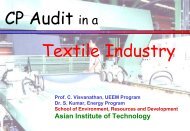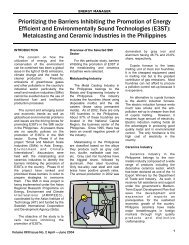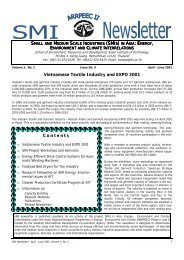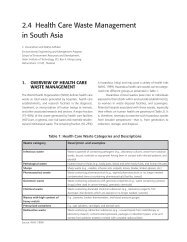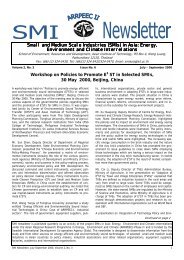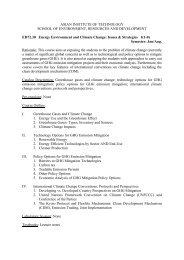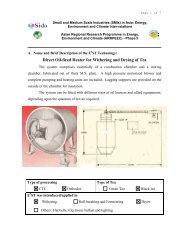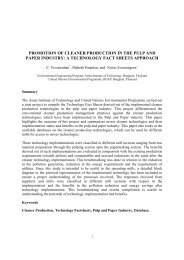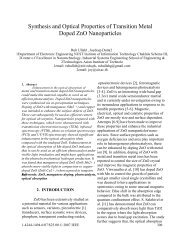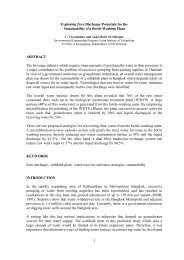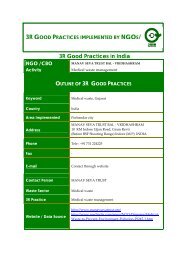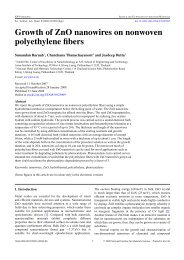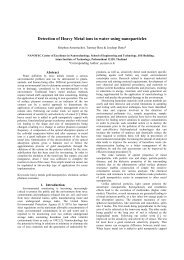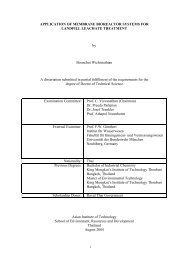A Gap Analysis in Selected Asian Countries, 3R Knowledge Hub ...
A Gap Analysis in Selected Asian Countries, 3R Knowledge Hub ...
A Gap Analysis in Selected Asian Countries, 3R Knowledge Hub ...
You also want an ePaper? Increase the reach of your titles
YUMPU automatically turns print PDFs into web optimized ePapers that Google loves.
98<br />
<strong>3R</strong> <strong>Gap</strong> <strong>Analysis</strong> and F<strong>in</strong>d<strong>in</strong>gs<br />
URBAN MUNICIPAL WASTE<br />
The rate of solid waste generation <strong>in</strong> the<br />
Philipp<strong>in</strong>es is comparable to that of other low to<br />
middle-<strong>in</strong>come countries. Recent studies<br />
<strong>in</strong>dicate that the per capita waste generation <strong>in</strong><br />
Philipp<strong>in</strong>es is about 0.3 and 0.5 kg/day <strong>in</strong> rural<br />
and urban areas, respectively. The National<br />
Capital Region alone accounts for 23% while<br />
the Southern Tagalog Regions contribute 13% of<br />
the total waste generated annually. <strong>Asian</strong><br />
Development Bank (ADB) estimates <strong>in</strong>dicate<br />
that about 6,700 metric tons of waste is<br />
generated every day <strong>in</strong> Metro Manila alone. The<br />
figure below presents the major sources of<br />
waste <strong>in</strong> the Philipp<strong>in</strong>es.<br />
In terms of waste composition, a survey<br />
conducted <strong>in</strong> n<strong>in</strong>e cities and ten municipalities<br />
under the Philipp<strong>in</strong>e Environmental<br />
Governance Program of the United States<br />
Agency for International Development reveals<br />
that around 60% of the solid waste is<br />
biodegradable materials. In a study conducted<br />
at five Metro Manila cities under the Metro<br />
Manila Solid Waste Management Project, it is<br />
identified that of the sampled MSW, 60% are<br />
biodegradable, 19% are considered as<br />
recyclable, 18% are residual while 2% are<br />
considered as hazardous or special wastes.<br />
Source of MSW <strong>in</strong> the Philipp<strong>in</strong>es<br />
source: www.3rkh.net<br />
Segregation and collection of solid waste is<br />
done at the village district or ward level for<br />
biodegradable, compostable and reusable<br />
wastes. Collection of non-recyclable materials<br />
and special wastes is the responsibility of the<br />
respective municipality or city.<br />
Waste from public <strong>in</strong>stitutions, together with<br />
those collected at the village district or ward<br />
level, are then transported by the city or<br />
municipality to disposal sites. It is estimated<br />
that Metro Manila spends over PHP 3.5 billion<br />
(USD 76 million) annually for the collection<br />
and disposal of MSW. The League of Cities of<br />
the Philipp<strong>in</strong>es survey <strong>in</strong> July 2005 reveals that<br />
garbage collection efficiency <strong>in</strong> cities average<br />
at 40% <strong>in</strong> terms of political area where about<br />
56% of the cities’ population is served. Quezon<br />
City has reported a collection efficiency of 99%<br />
<strong>in</strong> 2005. In the same survey there were reports<br />
that around 90% of the cities operate their own<br />
waste collection fleets while 10% contracts this<br />
to private haulers. Like other develop<strong>in</strong>g<br />
countries, <strong>in</strong>formal sectors, especially<br />
scavengers play a significant role <strong>in</strong> the<br />
collection, sort<strong>in</strong>g and recycl<strong>in</strong>g of urban<br />
municipal waste. Local Government Units<br />
(LGUs) <strong>in</strong> 2004 achieved over 31% of waste<br />
diversion to landfills/dumpsites ma<strong>in</strong>ly due to:<br />
• Massive public education campaigns<br />
• Distribution and implementation of<br />
segregation system for recyclable and<br />
compostable materials<br />
• Technical and<br />
logistical support to<br />
townships and NGOs<br />
F<strong>in</strong>d<strong>in</strong>gs<br />
In most cases, MSW is<br />
prevented from go<strong>in</strong>g to<br />
f<strong>in</strong>al disposal through the<br />
<strong>in</strong>stitutionalization of the<br />
Materials Recovery<br />
Facilities. While some<br />
LGUs employ manual<br />
segregation, others have<br />
mechanized material<br />
separation features. Still, other LGUs promote<br />
the “junkshop” approach, where<strong>in</strong> the<br />
recyclable materials are bought and sold by<br />
certa<strong>in</strong> <strong>in</strong>dividuals.



